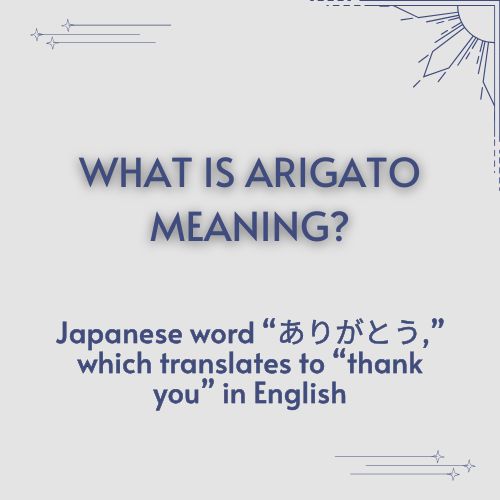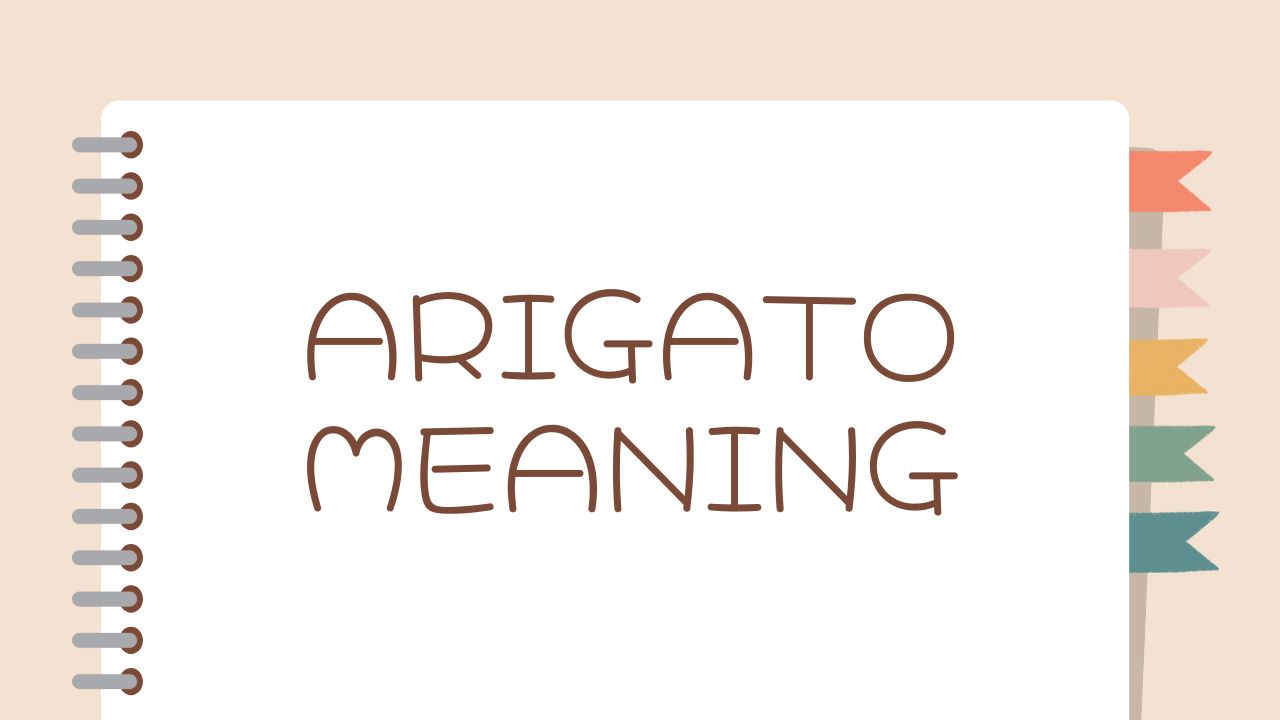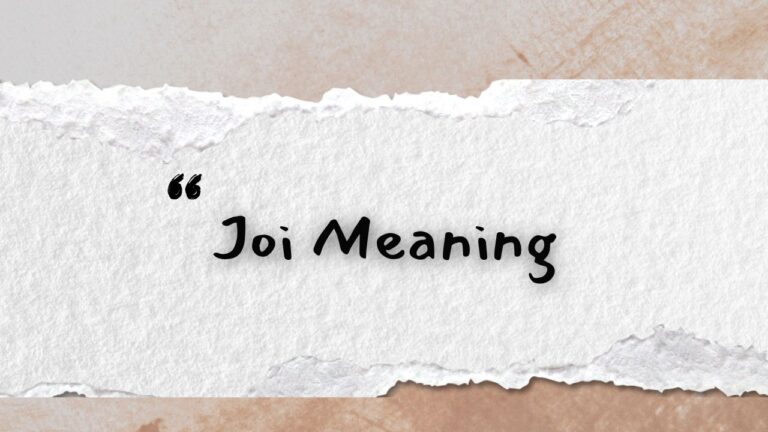Certain words travel beyond their original language and become known worldwide. “Arigato” is one such word from Japanese that people across many countries recognize as a way to say thank you. Its popularity has grown through cultural exchange, media, and tourism.
Whether spoken in a formal setting or during a casual meeting, this word carries a sense of politeness and respect. It is simple in sound but layered in meaning. In Japan, showing gratitude is more than just good manners it is a part of daily life.
Many expressions in Japanese are shaped by the idea that relationships are built on mutual respect. “Arigato” has also become a cultural symbol in movies, songs, and travel experiences. Visitors to Japan often learn it as one of their first words.
| Field | Information |
|---|---|
| Acronym | N/A |
| Stands For | N/A |
| Brief Description | A Japanese word “ありがとう” which translates to “thank you” in English, used to express gratitude in everyday conversation. |
| Antonym | Ingratitude, rudeness |
| Synonym | Thanks, appreciation |
| Alternative Possible Meaning on Internet | Song titles, restaurant names, or brand names |
| Emotion | Gratitude, warmth |
| Safe for Work | Yes |
| Safe for Children | Yes |
| Emojis | 🙏😊💐 |
| Trending Date | Often trends during cultural events, anime releases, or Japanese holidays |
| Texting Meaning | A friendly way to say “thank you” in Japanese, often as “arigato” or “arigatou” |
| Social Media Meaning | Used in captions, comments, and hashtags to show appreciation or reference Japanese culture |
What is arigato meaning?

The phrase arigato meaning refers to the Japanese word “ありがとう,” which translates to “thank you” in English. In everyday Japanese, it is a polite but casual way to express gratitude. The more formal version is “arigato gozaimasu,”
which is suitable for speaking to strangers, elders, or in business settings. The word comes from older Japanese forms, and its structure is tied to expressions of appreciation that date back centuries.
The tone can be warm and friendly among peers or respectful and serious in formal situations. Japanese language learners often start with greetings like “konnichiwa” and “arigato” as building blocks for conversation.
Read More: Shalom meaning
Where does the word “arigato” come from?
The history of “arigato” goes back to classical Japanese. It combines “ari,” meaning “to exist” or “to have,” and “gatai,” meaning “difficult.” In older contexts, the term meant “rare” or “difficult to have.” Over time, it came to mean “something rare and valuable” and eventually “thank you,” reflecting the idea that kindness is precious.
The concept of gratitude has deep roots in Japanese philosophy and social customs. Influences from Buddhism and Confucianism reinforced the idea that acknowledging help is important for harmony. During the Edo period (1603–1868), social etiquette became more formalized, and words like “arigato” found their place in everyday politeness.
How is “arigato” used in daily life in Japan?
In Japan, gratitude is expressed frequently and in many settings. Saying “arigato” is almost automatic when someone does something helpful, no matter how small. In shops, the staff often thank customers for purchases. On public transport, passengers may say it when receiving assistance. At school, students thank teachers for lessons.
Common situations include:
- Thanking a friend for sharing a meal.
- Showing appreciation when someone gives directions.
- Responding to compliments with humility.
Body language often supports the words. A slight bow or nod adds formality. In casual moments among friends, the tone may be light and cheerful. Between strangers, it is often paired with respectful gestures.
The frequency of “arigato” in daily life reflects the Japanese focus on maintaining smooth relationships. It signals acknowledgment of another person’s effort, whether large or small. Even when the action is expected like a shop clerk handing over a purchase expressing thanks is part of good manners.
What variations of “arigato” exist?
While “arigato” itself is common, several variations adjust the level of politeness:
- Arigato gozaimasu – More formal; used with people outside one’s close circle.
- Arigato gozaimashita – Formal past tense; used when thanking for something already done.
- Domo arigato – Adds emphasis, meaning “thank you very much.”
- Domo – Informal and short, used between friends or in casual situations.
For example, a customer thanking a shop worker will often say “arigato gozaimasu.” A student thanking a professor after a lecture may use “domo arigato gozaimashita.” Among friends, “domo” or plain “arigato” is more common.
These variations reflect Japan’s system of honorifics, which adjusts speech according to social relationships. The choice depends on the level of respect the speaker wishes to show.
Read more: Witherspoon meaning
How has “arigato” entered global culture?
The word has reached global audiences through entertainment, travel, and education. Tourists in Japan often learn “arigato” as part of basic travel vocabulary. Japanese films, anime, and music frequently use it in dialogue, making it recognizable worldwide.
Japanese restaurants outside Japan often use “arigato” in menus or decor. Staff may say it when customers leave, even if the rest of the conversation is in another language. In martial arts training, instructors may use “arigato” to close sessions, reinforcing respect between teacher and student.
The spread of Japanese pop culture has helped make the term part of casual vocabulary in many countries. People sometimes use it playfully with friends, even outside a Japanese context, showing how a cultural word can gain international appeal.
Why is gratitude important in Japanese society?
Gratitude in Japan is tied to the value placed on social harmony. Acknowledging help or kindness maintains balance in relationships. It is considered rude to accept assistance without showing appreciation. This principle appears not only in speech but also in actions, such as returning favors or offering small gifts.
In business, expressions of thanks are essential for building trust. At social gatherings, guests thank hosts for their hospitality, and hosts thank guests for attending. This mutual exchange reinforces relationships.
Schools teach children to say “arigato” from an early age. It becomes second nature, shaping how they interact with others throughout life. The habit of expressing gratitude contributes to the politeness often associated with Japanese culture.
Are there cultural rules for saying “arigato”?
Yes, the context, tone, and body language matter. In formal situations, a slight bow accompanies the words. Eye contact is usually brief, as prolonged eye contact can feel confrontational in Japanese culture.
Timing is also important. Saying “arigato” too late after the act can seem insincere. In service settings, it is common for both parties to thank each other the server for the customer’s patronage, and the customer for the service received.
In casual settings, a smile or relaxed posture may replace formal gestures. Among close friends, the tone can be playful. The speaker’s choice of variation plain “arigato” or a more formal form signals their relationship with the listener.
Examples of “arigato” in different contexts
- Friendship: “Arigato for helping me carry the bags.”
- Workplace: “Arigato gozaimasu” to a colleague for completing a task.
- Hospitality: Thanking a host with “domo arigato” after a meal.
- Public service: Saying “arigato” to a train station staff member who provides directions.
These examples show how flexible the word is across settings. It adapts to both intimate and public situations while keeping the core meaning of gratitude.
Summary table of “arigato” usage
| Variation | Level of Politeness | Common Contexts |
|---|---|---|
| Arigato | Casual | Friends, peers, informal settings |
| Arigato gozaimasu | Formal | Customers, elders, strangers |
| Arigato gozaimashita | Formal past | Thanking for completed actions |
| Domo arigato | Emphatic | Strong appreciation in formal or informal use |
| Domo | Very casual | Close friends, quick acknowledgment |
FAQs about “arigato”
Q: Is “arigato” used in formal speeches?
Yes, but usually as part of the longer “arigato gozaimasu” to maintain formality.
Q: Can non-Japanese speakers use “arigato” in Japan?
Yes. Locals appreciate the effort, even if pronunciation is not perfect.
Q: Is “arigato” gender-specific?
No. It is used by all genders without change in form.
Q: How should I pronounce “arigato”?
It is pronounced ah-ree-gah-toh, with a short “toh” sound at the end.
Q: Is “arigato” enough to be polite?
In casual situations, yes. In formal contexts, add “gozaimasu” for respect.







